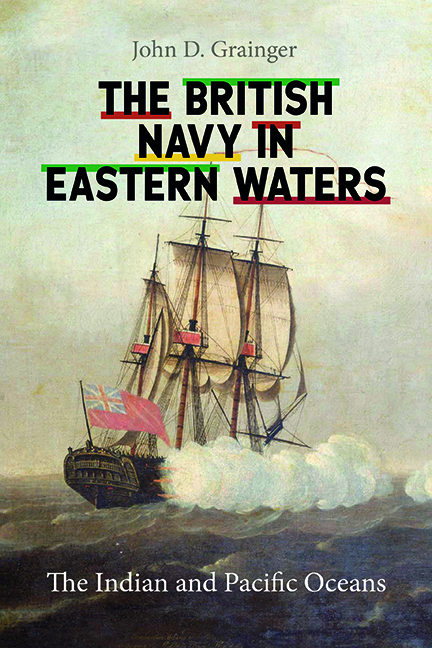8 - A Ring of Enemies (1783–1803)
Published online by Cambridge University Press: 26 May 2022
Summary
The endurance of the British forces in India and the Indian seas and of the East India Company in the face of the French assault between 1778 and 1783 was decisive for British control of India, though only in retrospect. That control was further consolidated after 1783, by the developments during the next ten years, and by the defence, once again, of the British position in India in the succeeding decades of warfare; this included the extension of British control as far as the Indus River. The American War had technically ended with the mutual return of conquered lands between the Europeans, but, as after 1748 and after 1763 this did not mean much in India and the east; for a start it took two years for the terms to be implemented. Negapatam was not returned to the Dutch; this was the only territorial change.
The successful voyages of the Pitt to and from China through the Indonesian islands in 1759 had been followed by more British ships sailing the same way, and by the Dutch formal prohibition of this, which the British ships, all large and well-armed, could easily ignore. It also emerged that Dutch control of the islands was by no means either universally welcome to the islanders or very extensive, relying as it did on repeated terrorising voyages of destruction, designed to prevent the production of spices in those islands the Dutch did not control; the Dutch may have claimed control of the seas because they held the islands, but most of the archipelago was not under their actual rule.
With peace in 1763 there had been no political need for this new route, the Eastern Passage, to be followed, since the South China Sea route was then available and reasonably safe, but one or two ships did take it, so that when the Dutch joined in the American War at the end of 1780 it was a relatively familiar route to many of the Company's captains. Participation in this war also produced a British blockade against Dutch traffic through the Malacca Straits and the Sunda Straits, and an almost complete halt to Dutch exports from Java to Europe, for, even if the Dutch ships could get through the immediate blockades, they were very liable to be captured on the long voyage to Europe.
- Type
- Chapter
- Information
- The British Navy in Eastern WatersThe Indian and Pacific Oceans, pp. 135 - 160Publisher: Boydell & BrewerPrint publication year: 2022

